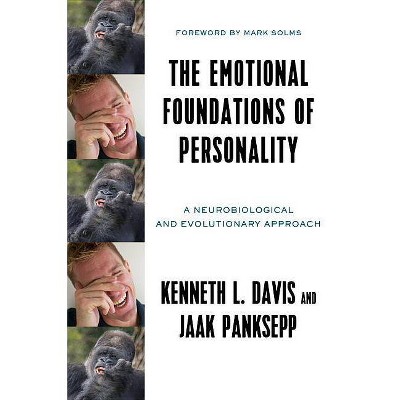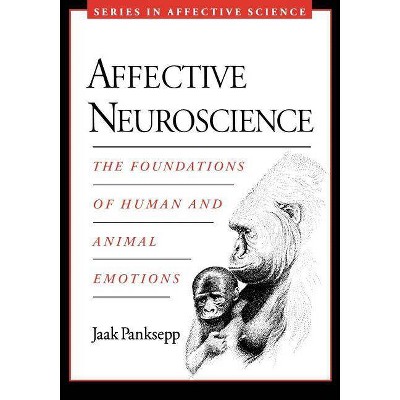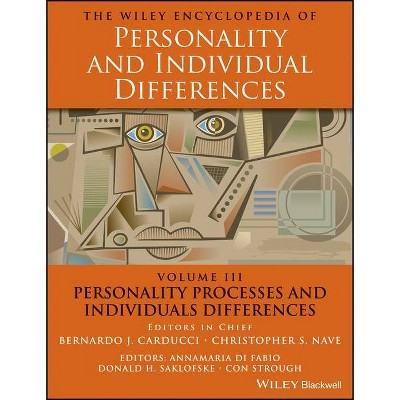The Emotional Foundations of Personality - by Kenneth L Davis & Jaak Panksepp (Hardcover)

Similar Products
Products of same category from the store
AllProduct info
<p/><br></br><p><b> About the Book </b></p></br></br><p>A <em>CHOICE Magazin</em>e Outstanding Academic Title of 2018.</p><p>A novel approach to understanding personality, based on evidence that we share more than we realize with other mammals.<br /></p><p/><br></br><p><b> Book Synopsis </b></p></br></br><p>This book presents the wealth of scientific evidence that our personality emerges from evolved primary emotions shared by all mammals. Yes, your dog feels love--and many other things too. These subcortically generated emotions bias our actions, alter our perceptions, guide our learning, provide the basis for our thoughts and memories, and become regulated over the course of our lives.</p><p>Understanding personality development from the perspective of mammals is a groundbreaking approach, and one that sheds new light on the ways in which we as humans respond to life events, both good and bad.</p><p>Jaak Panksepp, famous for discovering laughter in rats and for creating the field of affective neuroscience, died in April 2017. This book forms part of his lasting legacy and impact on a wide range of scientific and humanistic disciplines. It will be essential reading for anyone trying to understand how we act in the world, and the world's impact on us.</p><p/><br></br><p><b> Review Quotes </b></p></br></br><br>[A]n invaluable conversation starter for an overdue discussion on the nature of individual differences as well as on the tenets upon which personality theories rely. . . [A] delightfully written text.-- "Metapsychology Online Reviews"<br><br>I felt as though I had experienced an in-depth seminar with Panksepp and Davis. This is a thought-provoking work. Its wealth of background and research is outstanding. The writing style is moderately academic, yet engaging. . . . [T]ruly remarkable.-- "Psych Central"<br><br>Modern neuroscience understands, at long last, the brain basis of emotions. But how do emotions become personality? This remarkable book explores Darwin's insights, personality variation across species (from fish to primates), and the modern neuroscience of feelings. Importantly, it also has a lively account of the probable brain science behind the big five personality traits. Highly readable, it is part survey, critique, and explanatory model, tackling a key question in modern neuroscience: what makes us different?--Oliver Turnbull, Professor of Neuropsychology, Bangor University, Wales, UK<br><br>This important final work from Panksepp, who died in 2017, is a must read for those interested in personality theory, emotion theory, neuroscience, and clinical psychology. . . Essential.-- "CHOICE Magazine"<br><br>Jaak Panksepp has left an important legacy of work on behavior, mind, and brain. This is one other contribution to that legacy.--Antonio Damasio, Dornsife Professor of Neuroscience, Psychology & Philosophy Director, Brain & Creativity Institute University of Southern California, Los Angeles<br><br>This important integration of Jaak Panksepp's foundational contributions to understanding the sub-cortical processes involved in emotion and behavior with research on personality helps move the fields of development, psychology, psychiatry, and psychotherapy forward by anchoring our work with biologically based, evolutionarily informed insights into the factors that shape our minds.--Daniel J. Siegel, M.D., Mindsight Institute, Clinical Professor, UCLA School of Medicine, author, Mind: A Journey to the Heart of Being Human<br><br>This work by Davis and Panksepp extends but also recontextualizes Carrell's classical factor analytic work, which has long dominated the field of personality theory. This much-needed volume is not only a significant addition to The Norton Series on Interpersonal Neurobiology, it is simply a must-read for all personality theorists, while also offering critical insights to psychotherapists, clinical psychologists, and other mental health disciplines. Highly recommended!--Douglas Watt PhD, Clinical & Forensic Neuropsychology, Boston University School of Medicine, Lesley University Graduate School of Psychology<br>
Price History
Cheapest price in the interval: 20.49 on March 10, 2021
Most expensive price in the interval: 27.49 on November 8, 2021
Price Archive shows prices from various stores, lets you see history and find the cheapest. There is no actual sale on the website. For all support, inquiry and suggestion messages communication@pricearchive.us




















